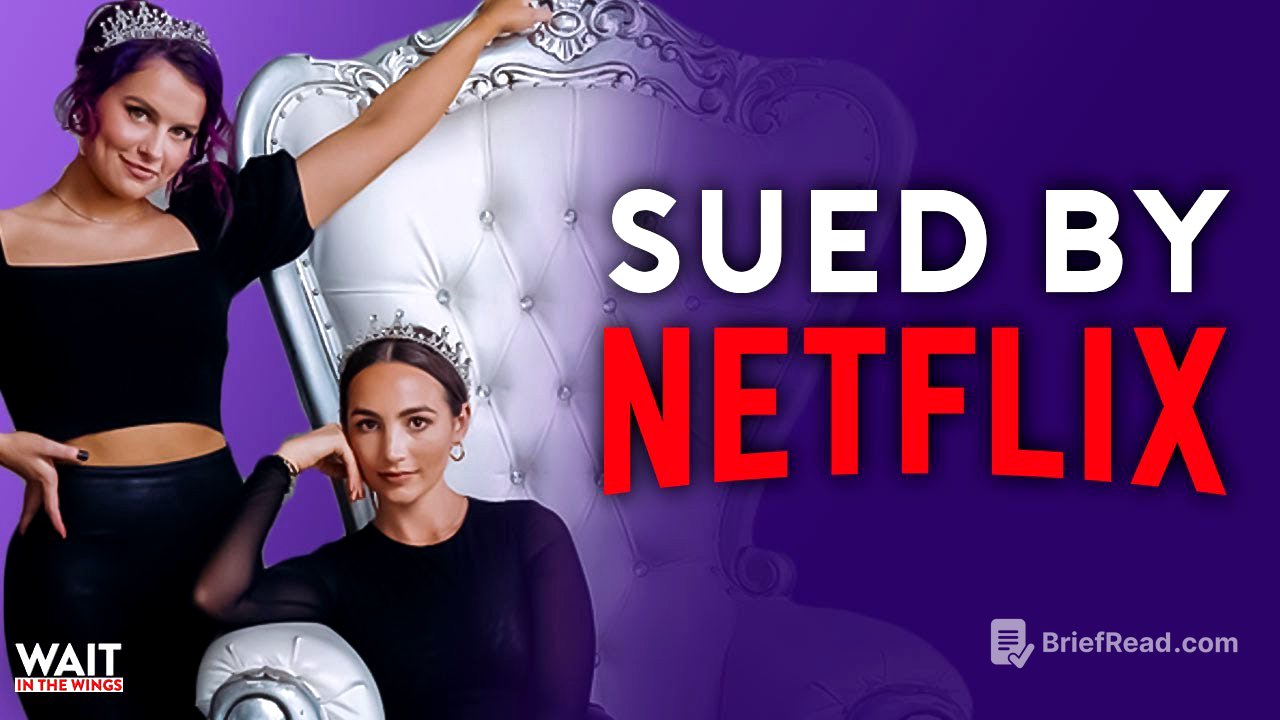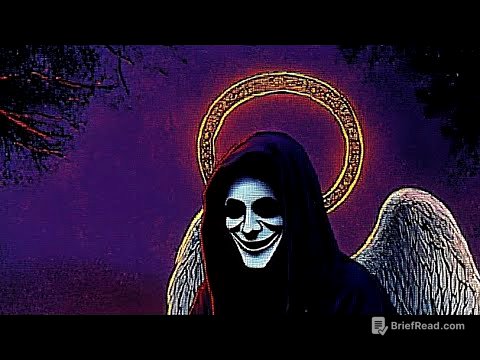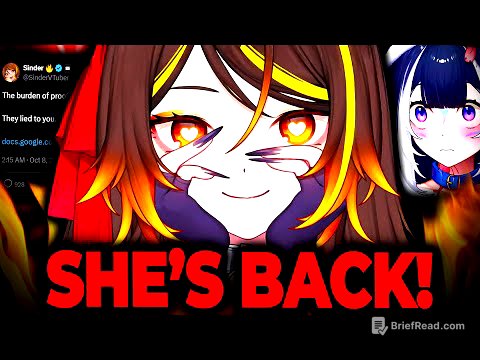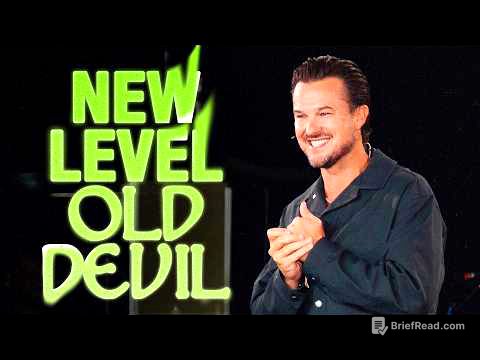TLDR;
This video tells the story of Abigail Barlow and Emily Bear, who created the unofficial Bridgerton musical and rose to fame, only to be sued by Netflix for copyright infringement. It explores their journey from struggling artists to award-winning composers, the complexities of fan-made creations, and the legal and ethical questions surrounding intellectual property.
- Barlow and Bear gained recognition through TikTok, leading to the creation of the unofficial Bridgerton musical.
- Despite initial success and a Grammy win, Netflix sued them for copyright infringement after unauthorized live performances.
- The case raises questions about fair use, the line between celebration and theft of intellectual property, and the pursuit of validation.
What's gonna happen next? [0:00]
In late 2020, amidst a global need for escape, Netflix released "Bridgerton," a steamy Regency era drama. Simultaneously, Abigail Barlow, an aspiring pop star, questioned her career path. Inspired by the show, Barlow posted a TikTok asking, "What if Bridgerton was a musical?" This simple question evolved into a multi-million dollar project, propelling Barlow and her musical partner, Emily Bear, to stardom with their unofficial "Bridgerton" musical. Despite the album's success, questions arose about securing rights to the show, as they didn't. Following a live concert, Netflix filed a 25-page lawsuit against them for copyright infringement. The video focuses on Barlow and Bear's journey from rejection to award-winning composers and examines the risks artists take in seeking validation.
Beloved Listeners! [1:53]
The video includes a brief advertisement for HelloFresh, using a "Bridgerton"-themed narrative. It promotes HelloFresh as a convenient way to enjoy fresh, quality meals delivered directly to your door, offering a discount code for viewers.
Meet Barlow [3:01]
Abigail Barlow's pop star dreams were fading after facing industry rejection and a toxic relationship that stifled her songwriting. In 2019, she decided to take control of her career, using TikTok as her performance space. She gained attention when Meghan Trainor invited her to collaborate, but the recording session was halted due to COVID-19. Barlow continued creating content on TikTok, showcasing her songwriting process and finding her voice. From January to June 2020, she wrote and posted around 50 songs, growing her following. She then started writing an original musical influenced by "Next to Normal" and was introduced to Emily Bear.
Meet Bear [5:10]
Emily Bear, at 19, had already achieved significant success, including singing Mulan on the Disney Channel in 2016. She began playing piano at age two, appeared on Ellen at six, and was mentored by Quincy Jones at eight. Despite their apparent differences, Barlow and Bear shared a love for musical theater and frustration with industry barriers. They teamed up to work on Barlow's musical, but the project eventually fizzled out.
Independence [6:09]
Both Barlow and Bear remained active as independent producers. Bear pursued pop music, while Barlow focused on a song called "Heartbreak Hotel." Barlow's significant online following helped "Heartbreak Hotel" reach number 23 on the iTunes pop charts and gain 200,000 streams on Spotify. However, Barlow's TikTok growth slowed, and she continued to face rejection from record labels. Her parents, who had been supporting her, urged her to find a stable job, leaving Barlow feeling stuck and worried about her musical future.
Ode to Remy [7:42]
In March 2020, Broadway theaters closed, leading to a surge in online creativity. A one-minute TikTok called "Ode to Remy" sparked a global trend of creating a musical based on the film "Ratatouille." Users contributed costumes, songs, and choreography. In January 2021, a Broadway production company staged a virtual run of the "Ratatouille" musical as a fundraiser for the Actors Fund. Inspired by this, Barlow's friend suggested she try something similar.
What if Bridgerton was a Musical? [9:03]
In January 2021, Netflix had over 192 million subscribers, with 82 million captivated by "Bridgerton," a romantic drama about elite families in the 1800s. The show follows Daphne Bridgerton's search for a husband, complicated by her overbearing brother, leading her to a fake courtship with Simon, the Duke of Hastings. Fandoms played a crucial role in Netflix's success, and "Bridgerton" fans were highly active on TikTok, creating fan edits and scene recreations. The show's cinematography and social commentary inspired Barlow, particularly a scene where a man lamented his inability to be with his true love. Barlow adapted the line into a song called "Daphne's Song."
Netflix's Blessing [12:57]
Emily Bear created a backing track for "Daphne's Song," leading to rapid development. People created playbill covers, dances, and scenes. To increase engagement, Barlow released a version of "Burn for You" for duets. Everyone involved with the series seemed to love the online musical. Unlike "Ratatouille," Barlow and Bear solely wrote the songs for the "Bridgerton" musical, breaking the wall between audience and creator. Sensing potential, they sought to record a full-length album, attracting record labels. They chose to produce the record independently to retain ownership of their masters and publishing. Barlow claimed they had Netflix's blessing, stating it was a fan-made creation, but this wasn't entirely accurate.
The Bridgerton Girls [14:34]
Barlow and Bear's lawyers initially sought Netflix's blessing in March 2021 but didn't receive a response until June, after the album was recorded. They sought approval for both the album and a live stage performance as a fundraiser for theater workers in the UK. Netflix, wanting to avoid competition with their own "Bridgerton" event, didn't approve or authorize the album or performance but didn't object. In August, Barlow and Bear's representatives informed Netflix that the UK performance was canceled but the album would be released on iTunes. They intended to shift focus to original work to avoid being labeled "the Bridgerton girls." They performed a six-song "Bridgerton" set at Elsie Fest in Brooklyn and at the Kennedy Center Honors.
Used with Permission [17:07]
On September 10, 2021, the unofficial "Bridgerton" musical album was released on iTunes, quickly reaching number one. Barlow and Bear continued to gain momentum, performing at live concerts and launching a campaign for a Grammy nomination. Netflix reminded them not to stage any live performances. Despite facing competition from established composers, they won the Grammy. Following the win, their representatives became demanding. Netflix was informed of a live concert at the Kennedy Center in July 2022 and another at the Royal Albert Hall in London. Netflix offered a license for these shows and continued album distribution, but Barlow and Bear declined.
Tightrope [19:44]
On July 20, Netflix sent a formal demand letter objecting to the Kennedy Center and Royal Albert Hall performances. Barlow and Bear released a graphic stating "Bridgerton is a trademark of Netflix, used with permission," which was misleading. The concert charged up to $150 per ticket without donating proceeds to charity, becoming competition for Netflix's live "Bridgerton" experience. On July 26, 2022, the concert took place despite Netflix's objections. On July 29, Netflix sued Barlow and Bear for copyright infringement. The video explains that legal complaints are written to favor the writer's interest. The video includes an interview with a lawyer who explains that the defendants could argue their use of the material aligns with the fair use doctrine.
Independence p2 [21:57]
Creating a parody musical involves legally walking a tightrope. Fair use allows using copyrighted material without permission if it's a parody or transformative work. "A Very Potter Musical" was staged because it parodied the original Harry Potter characters and didn't charge admission. The "Ratatouille" musical obtained permission from Disney for a limited, charitable performance. The unofficial "Bridgerton" musical is complicated because it isn't a parody, using verbatim dialogue and potentially causing consumer confusion. Shonda Rhimes and Julia Quinn criticized Barlow and Bear for taking intellectual property for financial benefit. The decision to decline Netflix's license stemmed from a desire for independence and the validation gained from the musical's success. "Bridgerton" became a vehicle for Barlow and Bear's success, leading them to continue exploiting it. The story raises questions about the line between celebrating and stealing someone's work and the risks taken in the pursuit of validation.









